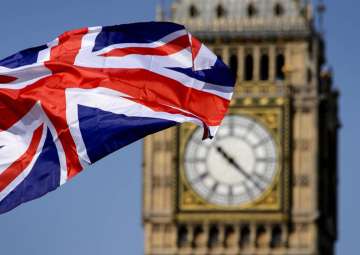European Union says little progress made in Brexit talks with Britain
The leaders meet in Brussels on Oct. 19-20, and with time short to seal a deal it had been hoped they would agree to widen the talks.

Brexit talks have made little progress, the European Union’s negotiator said Thursday, meaning he cannot yet recommend broadening the negotiations beyond the focus on the terms of Britain’s exit to include key issues such as future trade relations.
Michel Barnier said that despite the “constructive spirit” shown in this week’s fifth round of talks, “we haven’t made any great steps forward.” On the question of how much Britain has to pay to settle its financial commitments, he said: “We have reached a state of deadlock, which is disturbing.”
Barnier said he would not be able to recommend to EU leaders meeting next week that “sufficient progress” has been made to broaden the talks to future EU-British relations, including trade.
The leaders meet in Brussels on Oct. 19-20, and with time short to seal a deal it had been hoped they would agree to widen the talks.
The EU says this can only happen when there has been progress on the issues of the financial settlement, the rights of citizens affected by Brexit and the status of the Northern Ireland-Ireland border.
But Britain says these issues are closely intertwined with their future relations like trade and must be discussed together.
“I hope the member states will see the progress we have made and take a step forward” next week, British Brexit envoy David Davis told reporters.
“We would like them to give Michel the means to broaden the negotiations. It’s up to them whether they do it. Clearly I think it’s in the interests of the United Kingdom and the European Union that they do,” Davis said.
Barnier said the two sides would work to achieve “sufficient progress” in time for a subsequent meeting of EU leaders in December.
Britain must leave the EU on March 29, 2019, but the negotiations must be completed within about a year to leave time for EU states’ national parliaments to ratify the Brexit agreement.
Many businesses are worried that Britain could leave the EU without a trade deal in place, which would mean tariffs on U.K. goods entering, reams of red tape and chaos at ports. The pound fell Thursday on news of the slow progress, trading 0.6 percent lower at $1.3145.
European estimates on the size of the divorce bill have varied from around 60 billion euros to 100 billion euros ($70-120 billion), but Prime Minister Theresa May’s government has rejected such numbers without clearly explaining how the amount should be calculated.
“The U.K. repeated that it was still not ready to spell out these commitments,” Barnier said. “There have therefore been no negotiations on this subject.”
With the clock ticking, Barnier reaffirmed that parting with “no deal will be a very bad deal.”
“To be clear, on our side, we will be ready to face any eventualities, and all the eventualities,” he said.
The British government is under pressure from euroskeptic lawmakers to increase planning for a “no deal” Brexit, in which the U.K. leaves the bloc without a trade agreement.
Pro-Brexit lawmakers are urging May’s government to set aside money for new customs posts and other infrastructure that would be needed in the event of no deal. Some even say Britain should walk away from the negotiations if the EU does not agree to start the next phase by the end of the year.